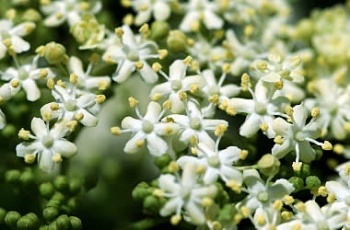Elderflower
From Wikiwel
Other Names: Arbre de Judas, Black-Berried Alder, Black Elder, Boor Tree, Bountry, Common Elder, Ellanwood, Ellhorn, European Alder, European Black Elder, European Black Elderflower, European Elderflower, European Elder Flower, Fleur de Sureau, Fleur de Sureau Noir, Flor de Saúco, Flos Sambuci, Hautbois, Haut Bois, Sambuc, Sambucus, Sambucus Flos, Sambucus Nigra Flos, Sambucus nigra, Seuillon, Sureau Commun, Sureau Noir, Sussier, Sweet Elder.
Elderflower is the flower of the Elder tree (Sambucus nigra). An extract of the flower is used to make medicine.
See also : Elderberry
Special Precautions of Elderflower
- Elderflower is LIKELY SAFE when used in amounts found in foods. Elderflower seems to be safe for most people when used in small amounts as part of a combination product containing elderflower, sorrel, gentian root, verbena, and cowslip flower (SinuComp, Sinupret). There isn't enough information to know if elderflower is safe when used in medicinal amounts other than as part of the combination product. The combination product can cause digestive system upset and occasionally allergic skin rash.
- Not enough is known about the safety of applying elderflower directly to the skin.
- Pregnancy and breast-feeding: Not enough is known about the use of elderflower during pregnancy and breast-feeding. Stay on the safe side and avoid use.
- Diabetes: There is a concern that elderflower might lower blood sugar levels. If taken with diabetes medications, it might make blood sugar levels go too low. If you have diabetes and use elderflower, be sure to monitor your blood sugar levels carefully. Check with your healthcare provider to see if the dose of diabetes medications you are taking needs to be lowered.
- Surgery: Elderflower might lower blood sugar levels. There is some concern that it might interfere with blood sugar control during and after surgery. Stop using elderflower at least 2 weeks before a scheduled surgery.
- Medications for diabetes (Antidiabetes drugs) interacts with Elderflower.
Actions
- Flower: diaphoretic, anticatarrhal, antispasmodic.
- Elderberry: diaphoretic, diuretic, laxative.
- Leaf: diaphoretic, diuretic, emmolient, vulnerary, expectorant.
Benefits and uses of Elderflower are
Elder flowers, the flowers of the elder tree (which also gives us elderberries), are rich in flavonoids, minerals, phenolic compounds, volatile oils, and more.
- anti-catarrhal herb, meaning it is extremely effective for runny noses and congestion.
- In traditional Greek medicine, elder flowers were used as a diaphoretic (to increase sweating, which is helpful for eradicating a virus from your system).
- In Germany, elder flower is commonly used to treat feverish common colds, and in the US and Canada, elder flower may be combined with yarrow flower and peppermint leaf in tea form to relieve colds and flu. Elder flower has been traditionally used as a tonic to boost immunity.
- It is also widely known to promote lung and bronchial tract health. If you’re battling a cold or flu, try drinking elder flower tea (combined with yarrow, boneset, linden,peppermint, and ginger, if you like) hot and often to help induce sweating and flush the virus out.
- Treating sinusitis when taken with gentian root, verbena, cowslip flower, and sorrel. Taking a specific combination product containing elderflower, gentian root, verbena, cowslip flower, and sorrel (SinuComp, Sinupret) seems to help treat swollen sinuses.
- Bronchitis.
- Cold.
- Flu.
- Cough.
- Hoarseness (laryngitis).
- Diabetes : Elderflower might work like insulin to lower blood sugar.
- Arthritis-like pain.
- Constipation.
- Swelling (inflammation).
- Current research reveals elderberry and flower’s antiviral efficacy on influenza, colds, sinusitis, and Herpes simplex and zoster. The flavonoids of elder contain immunostimulatory properties for influenza A and B. An in vitro study on H1N1 demonstrated how elderberry flavonoids would bind to and prevent H1N1 infection, by blocking the virus’ ability to infect host cells.
- Studies suggest elder’s immunostimulatory properties can be transferred to help with cancer and AIDS.
- In cases of methicillin-resistant Staphylococcus aureus (MRSA), where therapeutic options are limited, elder is an alternative to antibiotics by preventing some of the mechanisms for Staphylococcus aureus to survive.
- Elderflower’s flavonoids could be effective in the prevention and treatment of insulin resistance, stimulating insulin-dependent glucose uptake. The berries’ polyphenol antioxidants help lower the risk of metabolic diseases and cardiovascular illnesses.
